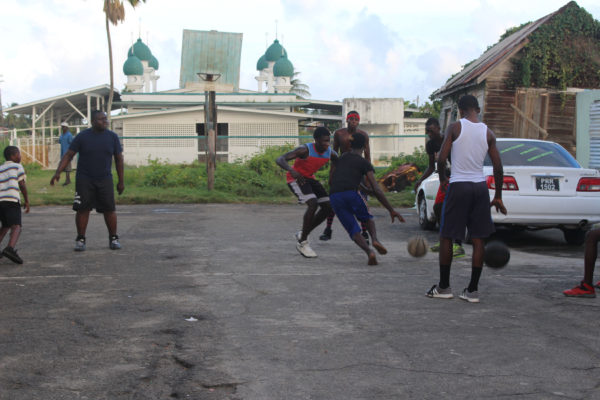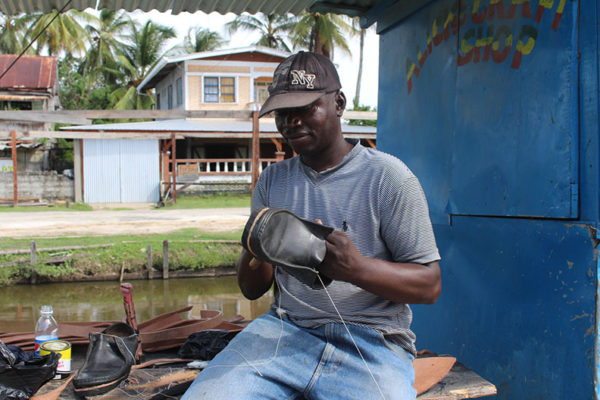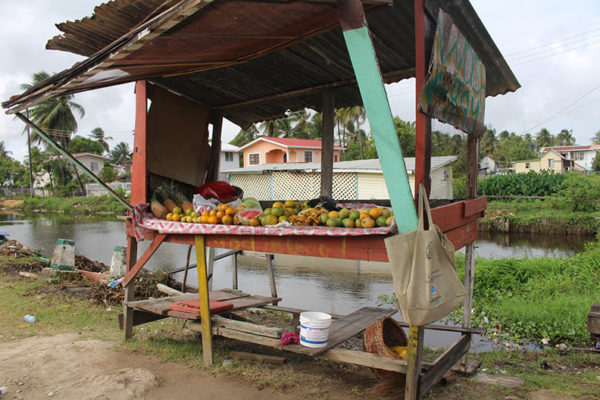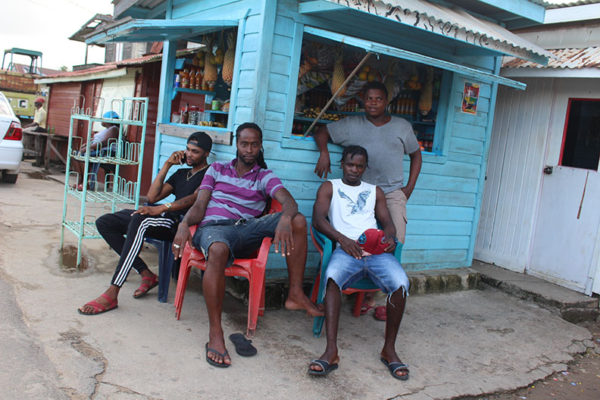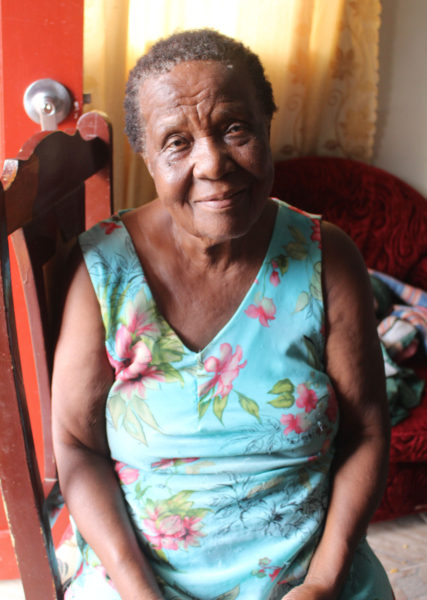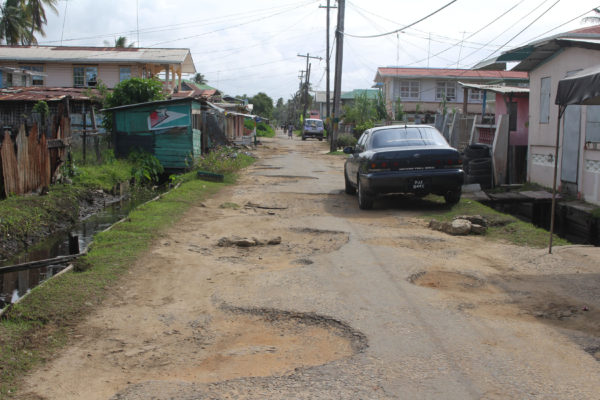Story and photos by
Joanna Dhanraj
The lively village of Ann’s Grove, probably ‘the village that never sleeps,’ was founded back in the early 1800s. According to one resident, persons parade the road day and night, and according to another the buses work all day and throughout the night.
Ann’s Grove is situated on the East Coast Demerara, some 30 kilometres/18.6 miles from Georgetown. The village is said to have approximately 5,000 residents.
When the World Beyond George-town visited, school was in session but the ‘School Street’ teemed with activity; buses drove through, either leaving the bus park (situated in the middle of the street) or headed to park, and young men hung around the snackettes and stalls situated along the road including one with his pet turtle.
Mohamed Baksh better known as ‘John’ or ‘Uncle John’ to the children, is the proprietor of a small shop opposite the Ann’s Grove Secondary School. Baksh was seated outside his shop under the awning awaiting the school bell when students would pour over to make purchases.
Baksh was raised in Ann’s Grove and has been here his entire life. His grandparents arrived on a boat from India, he said and later settled in the village.
“Ann’s Grove is a bright place. People liming on the road all day until [the wee hours] of the morning. Weekends look like Sheriff Street…, people dress and come out. Every weekend we got barbecue here,” he said.
According to Baksh, apart from being a sprightly village, Ann’s Grove is considered to be a peaceful, friendly and crime-free village as well. In fact, he once forgot to close his shop before he went home, but arrived a few days later to find it open and everything intact.
However, what he is affected by is flooding. Parts of the village flood whenever there is heavy rainfall and with the recent downpours, it was no different. “The flooding affects a lot of people…, especially the people who have kitchen gardens. What we want to see, are the drain cleaned. The drains are all clogged up. They [the Neighbourhood Democratic Council) clean them once-upon-a-blue moon,” he complained.
“The road is a bigger issue. The road that I Iive through is really bad and something needs to be done about it. The road was built since the primary school was built, in the early 1990s.”
Having his business opposite the school allows him, he said, to see what some of the teachers and students are doing and he’s really concerned about the situation. Punctuality, he said, is a big problem for many persons. Teachers walk in late, he said, and children pattern them arriving many times at recess. According to rumours, a good number of teachers stay away from school days at a time. This shouldn’t be, he lamented.
“Nowadays children dropping out of school. Long ago we used to get licks to go to school and when big people talk you had to listen,” said Baksh.
The Ann’s Grove Primary and Nursery are in another street.
At my next stop, children played out front; 84-year-old Iona Simon lives here. She isn’t as up to date with what Ann’s Grove is like now so she shared what it was like when she was just a girl.
She recalled that her mother died when she was just 13 years old. And although Ann’s Grove is just a drive away from the city, she never visited Georgetown until she was around 15 or 16 years old, when neighbours took her and her siblings “for a walk… I remember going to town and seeing the statue and saying ‘Good morning’ and the people around started to laugh. My neighbours [then] explain about the statue,” she chuckled. “Being, that I come from the country I was saying ‘Abee’ and ‘Ayo’ and people mocked me and say ‘Country come to town’.”
Before the school was called Ann’s Grove Primary, it was the Roman Catholic School which Simon attended. However, due to finances she was unable to continue.
She believes “this generation” puts much more emphasis on getting an education even if it means someone from outside assisting. Nonetheless, Simon went on to say that even today with persons furthering their studies, it is still difficult for them to attain suitable jobs. And with all the emphasis placed on education, she doesn’t believe teachers pay as much attention to children as they did decades ago. In her day when children missed school, the teacher never waited on welfare officers but instead went in search of them.
“When you see you used to go in the school, your hair must be well-combed; your teeth clean, your yachting boots or your shoes proper and your nails short and clean; they checking every day,” she recounted.
“After school we used to get homework to do. We used to take the homework [period] to play hula hoops, hopscotch and skip. The next day when the school master ask for homework, you better have it or some lash ketch you across your back.
“Sometimes you stay home from school and mommy send you to buy fish and you got to pass the school and if the school master spot you, he’ll just get to boys to go behind you and bring you in the school. If you buy your fish already, well, you’ll just have to stay in school with it till school over.
“Some children mother used to gone to work and leave the children to ready for school and they ain’t go and the school master will reach till at their house and if they under the bed hiding, you better believe he going under to and getting them out. You got to go to school, he serious about that. Long time teachers took interest in doing home visits.”
Simon also recalled fetching the black water in her Gobi (a calabash with a hole cut into it which was covered with another part of the calabash) which she let down into the canal by a string.
The houses then she said were called ‘trash house’ since they were made from dried coconut leaves which were plaited and sold to persons wanting to build their houses. She too, had learnt to plait the leaves.
Then she shared something most of us have never heard of. “We used to dry the outside of the cabbage and cover our floors. We scrub the floors with a leaf called ‘crata’ since them old people never used to want you use soap. The crata was a broad leaf; when you soak it, it like soap [it lathered when wet],” she said.
Simon spoke of the once thriving market, where she got her fish and vegetables. “Back then had good things to eat; the green plantain we used to grate to make porridge used to be brown not cream like now. Now you buy greens and it melt out before your eyes,” Simon said.
Market days are on Fridays and Saturdays but there’s barely any selling there to call it a market. The drivers use the space for a bus park. Today many of the vendors have since put up stalls at Mon Repos Market.
Simon is contented with the way her village has progressed through the years but said there’s one thing that needs attending to; that’s the road.
Through another street, where the road is badly broken and running water can be seen beneath vehicles, lives 79-year-old Greta Wilson. She, too, had a really good story to share.
“I was bad when I used to go to school. I used to like to fight. Don’t matter how the headmaster beat me, I still used to fight. Because of complaints, my grandmother take me out of school; I only reach fifth standard,” she recalled.
“My grandmother wanted me to go to learn and sew, but me neva did want that. I tell she I want to sell. Me mother buy a load ah greens and me went and sell. I was 13 when I start selling. I sell at the Kitty Market and the market in Mackenzie, Linden. From what me make me mother buy a fridge, gas stove, sewing machine and a pair a bangle, thick like me two fingers. I sell till I reach 61.”
She shared also that the people she grew up with were well-mannered and recalled her grandmother saying that even if she had riff with a neighbour or relative, she should always say “howdy”. Many of the youths, she added, are unlike the older generation and fail to uphold certain values like manners, for example.
Apart from them not wanting to say ‘good morning’ or ‘hello’ she claimed that they’re not hygienic. “Long ago the sanitary officer used to walk around and check your toilet and your yard, now they don’t do that. The trench water, you could ah dip it and put it to settle and drink it. It had a man name Mr Collins, who used to watch to see if anybody going and swim in the water and he used to say, ‘Hello, not in here’ and if you ain’t hear, he used to beat you and tell you, ‘Go home and tell you mommy’. You can’t throw your dog in the trench when it dead. You had to bury it. Now things get slack,” she lamented.
She reminisced of a time when the train ran and called it “the happy days”. During that time, Queen Elizabeth 11, her sister Princess Margaret and Elizabeth’s husband, the Duke of Edinburgh Prince Phillip visited at different times. When the Queen visited she was travelling to Berbice and Wilson along with the rest of her school went out on the road to wave to her as she went by. The next day, she said, the Queen designated a holiday since she believed the children needed a break from school. Those are days Wilson says she’ll never forget.
Years later she looks around Ann’s Grove and Guyana at what has been going on and has a few concerns.
“You see that meter thing, I don’t like it. I live me alone, I can’t deal with that. The water and all too ain’t proper. It itches you skin; you always got to put something in it. I does put Dettol,” she said.
“Look at the youths today. They need to bring back National Service for the sake of the youths; they need discipline.”
She added, “My 80-year-old cousin from the States called me the other day and say ‘you know as big as me be, I’m learning. They pay us to make craft.’ It would be nice to have a centre where the youths and the old people can learn skills.”


